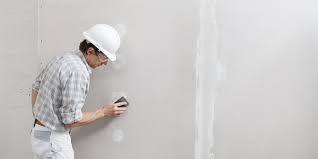In the world of modern residential construction, drywall may not be the most glamorous or exciting topic. After all, it’s frequently hidden behind a layer of paint or wallpaper, serving as a humble backdrop to our everyday lives. However, drywall plays an important role in shaping our living spaces, providing numerous benefits that contribute to our homes’ comfort, safety, and aesthetics. In this blog, we’ll look at the numerous benefits of drywall in modern residential construction.
- Cost-Efficiency:
One of the most significant advantages of using drywall in residential construction is its low cost. When compared to other building materials like plaster, brick, or wood paneling, drywall is a bargain. Its ease of installation translates into lower labor costs, making it an appealing option for both homeowners and builders. The cost savings can be substantial, allowing homeowners to allocate their budgets to other aspects of construction or home improvement projects that are more important.
- Quick Installation:
In the construction industry, time is money, and drywall excels in this area. When compared to other methods such as plastering or installing wooden panels, drywall installation is a relatively quick and simple process. This efficiency can drastically shorten construction timelines, allowing homeowners to move into new homes or enjoy renovated spaces much sooner.
- Design Versatility:
Because drywall is so versatile, homeowners can achieve a wide range of design possibilities. Whether you want a sleek, modern look or a classic, traditional ambiance, drywall can be customized to meet your aesthetic needs. Its smooth, blank canvas allows homeowners to paint, wallpaper, or texture in a variety of ways, allowing them to create unique and personalized living spaces.
- Excellent Sound Insulation:
Sound insulation is an important consideration for modern homes, particularly in cities with noisy neighbors or busy streets. Drywall has excellent sound insulation properties, allowing for less noise transfer between rooms and a more peaceful living environment. Homeowners can improve soundproofing in their homes by adding additional layers of drywall or using specialized acoustic drywall.
- Fire Resistance:
Safety is essential in residential construction, and drywall contributes to home fire safety. The main component of drywall, gypsum, is a naturally fire-resistant material. When heated to high temperatures, it emits water vapor, which effectively slows the spread of flames. While drywall is not completely fireproof, it can buy valuable time for residents to flee and firefighters to arrive, making it a valuable addition to any home.
- Energy Efficiency:
Energy efficiency is a growing concern in modern construction, driven by environmental awareness as well as cost savings. Drywall can help to improve the energy efficiency of a home. Homeowners can reduce heat loss in the winter and heat gain in the summer by installing drywall with added insulation or using specialized thermal-resistant drywall products. This means lower energy bills and a more comfortable indoor climate all year.
- Simple Repairs and Maintenance:
Life happens, and homes are no exception. The good news is that drywall is relatively simple to repair and keep in good condition. Small dents, scratches, or holes can be easily repaired, and the surface can be repainted or retextured to look brand new. As a result, drywall is a viable option for homeowners who value longevity and low maintenance costs. https://taylorlockleardrywall.com/ is here to provide expert repairs and maintenance to ensure that your walls and ceilings remain in top-notch condition for years to come.
- Eco-Friendly Building Materials:
As sustainability becomes a more important concern in construction, eco-friendly building materials are becoming more popular. Environmentally friendly drywall options are being produced by drywall manufacturers in response to this trend. Some of these products are made from recycled materials, which reduces their environmental impact. Furthermore, some drywall types are designed to improve indoor air quality by resisting mold and mildew growth, making them healthier choices for homeowners.
- Resale Value:
First impressions are important in real estate. Homes with well-kept drywall interiors typically have higher resale values. Potential buyers are frequently drawn to clean, well-finished walls that require little to no renovation work. Investing in high-quality drywall during construction or remodeling can thus pay off in the long run by increasing your home’s resale value.
- Recycling and Sustainability:
Drywall is recyclable, and recycling can divert a significant amount of waste from landfills. Gypsum, which is the primary component of drywall, can be reprocessed and reused to create new drywall sheets. This reduces the demand for raw materials and aids in the conservation of natural resources.
To summarize, while drywall may not be the most aesthetically pleasing aspect of modern residential construction, its advantages cannot be overstated. DRYWALL plays an important role in shaping our homes, from its low cost and quick installation to its excellent sound insulation and fire resistance. Its design versatility, energy efficiency, ease of maintenance, and eco-friendly options make it an excellent choice for both homeowners and builders. Finally, the benefits of drywall extend beyond aesthetics, contributing to the comfort, safety, and sustainability of our living spaces. So, the next time you admire your home’s walls, remember that drywall is a foundation that provides numerous benefits for a modern, comfortable, and secure living environment, find more here.



